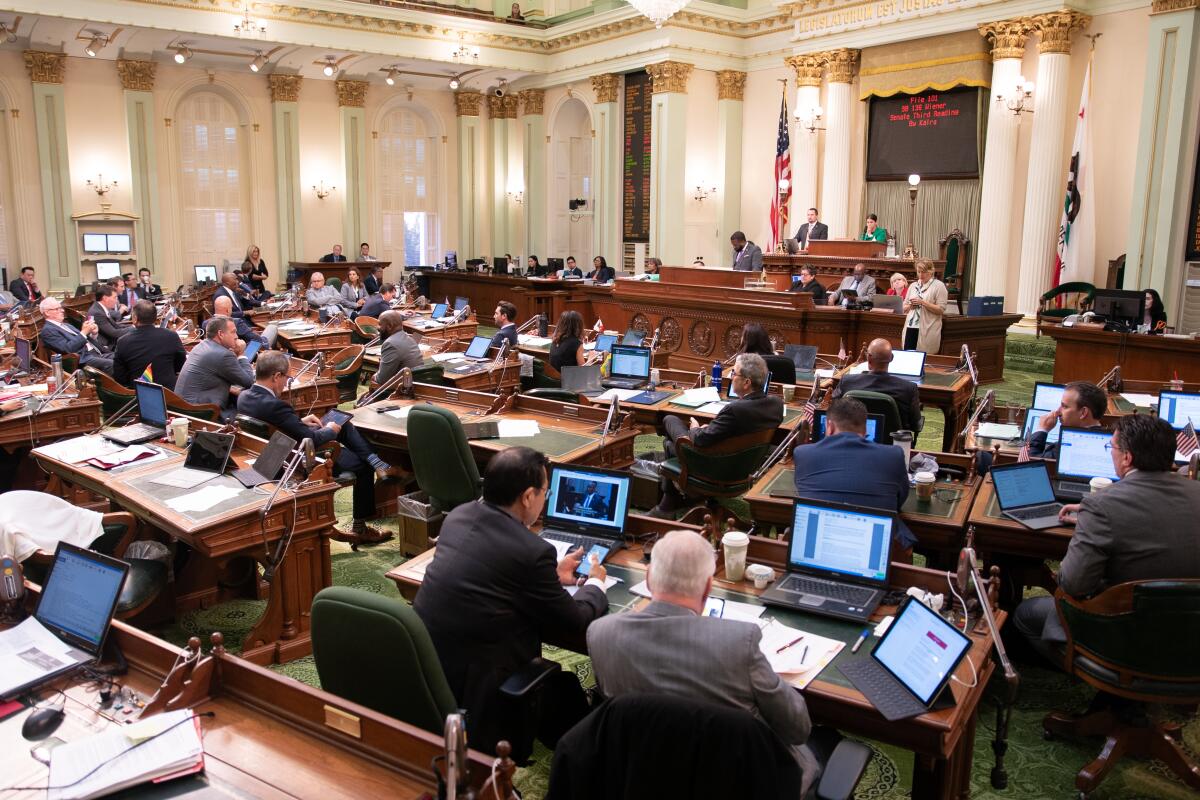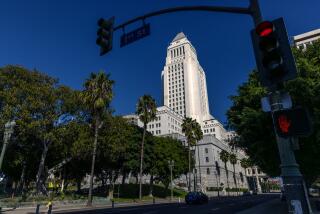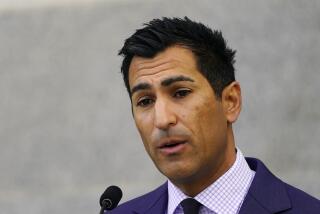California Legislature will let some lawmakers vote remotely amid COVID-19 pandemic

SACRAMENTO — Citing the threat of coronavirus, both houses of the California Legislature plan to allow some members at higher risk for COVID-19 to weigh in on pending bills from their districts when the Legislature reconvenes in Sacramento next week, a change in the rules that has drawn criticism from some current and former lawmakers.
Under a proposal announced Thursday by Assembly leadership, a small number of members — expected to be around 10 — would submit written instructions on their votes to the chief clerk before a floor session. One of the house’s four top leaders would then cast a proxy vote on the floor for the absent legislator.
The plan is intended to help lawmakers most vulnerable to serious risks from coronavirus, including those over age 65 and members with underlying health conditions, officials said.
“Given a spike in COVID-19 cases across the state, the Assembly is obliged to pursue safety with more stringent measures,” Assembly Speaker Anthony Rendon (D-Lakewood) said in a statement. “As a result, we will implement very limited proxy voting for floor sessions to allow our most vulnerable members to participate without being physically present on the Assembly floor.”
A resolution enacting limited proxy voting will be introduced next week when the Assembly returns from a two-week break taken after two legislators and several staff members tested positive for COVID-19. California this week became the state with the most coronavirus cases in the U.S.
Leaders of the state Senate have decided to allow some members to vote remotely on bills in committee, but not on the Senate floor, according to Senate President Pro Tem Toni Atkins (D-San Diego). The proposal would also require absent legislators to cast votes from their district offices.
“As California continues making our way through this pandemic, the Legislature has to keep exploring ways to conduct the people’s business safely and in keeping with our Constitution,” Atkins said Thursday.
She said the Senate has been testing a framework for remote voting since March in case it became needed.
“In keeping with this framework, the Senate’s process will allow for remote voting in committee hearings when we return from recess,” Atkins said.
Sam Blakeslee, vice chairman of the open-government group California Common Cause and a former Republican legislator who served as Assembly Republican leader in 2009 and 2010, called the Assembly proposal for proxy voting “very disturbing” and said he believed it was illegal.
“I am a little shocked to hear that the Assembly is even considering the idea of proxy voting,” Blakeslee said. “There is no provision in the [State] Constitution where the right and duty to vote can be delegated to another person.”
Blakeslee said proxy voting could lead to abuses, with lobbyists and special interests attempting to sway votes out of public view, betraying a system in which voters elect a representative to cast votes on bills.
“Such an approach, if extended, could allow a single individual of the Legislature to essentially control all votes and they would cease to operate in a democracy,” he said. “There is a real peril.”
Blakeslee also opposed a proposed ballot measure to allow proxy voting that recently failed to gain support in the Assembly.
Assembly Republican floor leader Heath Flora of Ripon said he supports the new process as a temporary measure for “helping elected members who are vulnerable to COVID-19 still be able to represent their constituents in the Legislature,” but added “we hope that this emergency process is not taken advantage of for other political purposes.”
Assembly Republican Leader Marie Waldron said the Legislature should not allow proxy voting until it gets approval from the voters.
Other lawmakers also have concerns. Assemblyman Kevin Kiley (R-Rocklin) said it sets a bad precedent.
“For months the speaker has insisted that proxy vote is unconstitutional, so it’s not clear why we’re going to now go ahead and do it anyway,” Kiley said. “While remote voting might be justified under very narrow circumstances, the concept of proxy voting, where you hand over your vote to another legislator, is incompatible with representative government.”
Former Assemblyman Mike Gatto, a Democrat from Glendale, said he also has some misgivings but said the proposal is a “reasonable” one-time accommodation during the health crisis.
“When deciding issues that affect millions of Californians, there is tremendous value in old-fashioned, in-person debate and discussions,” Gatto said.
He noted that Congress allows forms of limited proxy voting.
”It is important that emergency accommodations don’t become permanent, though,” he said. “There is a reason why legislatures gather together, and that precious tradition shouldn’t be compromised when things return to normal.”
Under the Assembly proposal, the Assembly’s chief clerk will keep a list of lawmakers requests for proxy votes to make sure accurate votes are cast. The proxy votes will be cast by one of four leaders: Rendon, Assembly Majority Leader Ian Calderon (D-Whittier), Assembly Republican Leader Marie Waldron of Escondido and Flora.
Rendon said there will be strict rules on the use of proxy votes during floor sessions.
“A process for allowing such votes and ensuring the transparency of every vote has been developed. It will also provide for the opportunity to verify voting accuracy. We will maintain a quorum of members physically present on the Assembly floor for all floor sessions,” he said. “Extraordinary times require extraordinary measures.”
Assembly officials said members would not be required to make their votes public before they are cast by proxies, which would provide a chance to view a lawmaker’s position on a bill in advance of the vote during floor session.
The extraordinary proposal for proxy votes was made just days after Assembly members Tom Lackey (R-Palmdale) and Autumn Burke (D-Marina del Rey) confirmed that they had tested positive for COVID-19, resulting in the Assembly delaying its return from summer recess by two weeks.
Lackey was hospitalized with complications from the virus but is back home recovering and expects to be well enough to attend floor sessions and cast his own vote.
“I will not request remote voting because I will appear in person and represent my constituency,” Lackey said in a statement. “The people put their faith in me to vote on their behalf.”
He said the public expects its government to function even in a crisis.
“Personal engagement is an important element in decision making,” he said. “Remote voting would surrender our democracy.”
In addition to legislators, a half-dozen Assembly and Senate staff members have also tested positive for coronavirus. The cases have been reported in spite of preventative measures at the state Capitol, including temperature checks and health screening interviews at public entrances, and encouragement that public testimony be done by phone from outside committee rooms.
Blakeslee said he has been in discussions with a leader of the Senate about an alternative process in which legislators would vote remotely from their district offices in a live video feed “where they are not surrounded by lobbyists and special interests,” in order to assure the public of a fair process.
Senate officials said guidelines are still being developed for remote voting.
The unscheduled pause in legislative operations will also require substantial changes in the process of reviewing bills before final votes are taken in the two houses. The deadline for proposals to have cleared policy committees was supposed to be July 31. But the Assembly and Senate have scheduled key committee hearings well into August.
The Senate, under a draft schedule obtained by The Times, is planning to hold some committee hearings on Saturdays. With this being the final year of the two-year session, time is limited. The California Constitution limits the passage of most bills after Aug. 31 in even-numbered years. Additional time could be added only if Gov. Gavin Newsom were to call a special session of the Legislature.
Lawmakers began to see the results of the tightened schedule on Thursday.
Senator Hannah-Beth Jackson (D-Santa Barbara), chairwoman of the Senate Judiciary Committee, sent a letter Thursday to colleagues letting them know that her panel will only hear 26 of the 80 bills that it has receivedbecause it will only be able to hold about 12 hours of hearings in total.
“Given the truncated session because of the COVID-19 pandemic, I have the unpleasant task of trying to identify those bills we will be able to hear in the limited time-frame in which we have been given to hear them,” Jackson wrote, adding that she screened out many bills not related to COVID-19 or criminal justice reform.
More to Read
Sign up for Essential California
The most important California stories and recommendations in your inbox every morning.
You may occasionally receive promotional content from the Los Angeles Times.











